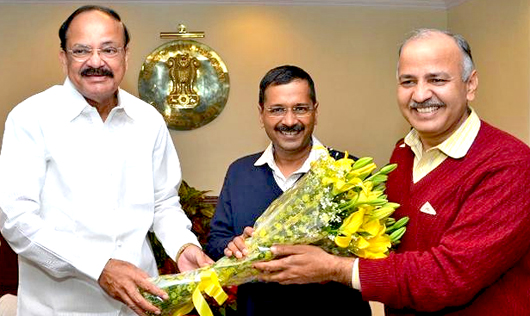New Delhi, Jan 30: Tension spiralled in Jamia Nagar on Thursday after a man fired a pistol at a group of anti-CAA protesters, injuring a Jamia Millia Islamia student before walking away while waving the firearm above his head and shouting "Yeh lo aazadi" amid heavy police presence in the area.
Massive protests erupted in the area after the incident with hundreds of agitated people gathering near the university, breaking barricades and clashing with police personnel.
The man, who identified himself as "Rambhakt Gopal", was subsequently overpowered by police and detained. He was taken into custody and was being interrogated, police said.
The entire drama, which triggered panic in the area, was captured by television cameras that showed the man in light coloured pants and a dark jacket, walking away on an empty road barricaded by police, turning around and shouting at the protesters in Hindi, "Here, take this freedom."
The gunman went live on Facebook before the brandishing the gun. Police said they were verifying whether it is his real name.
Before the attack, the man also put out messages on Facebook stating "Shaheen Bhag Khel Khatam" (Run Shaheen, the game is over). Another message stated, "Please wrap me in saffron in my last journey with slogans of Jai Shri Ram". His Facebook profile was deleted after screenshots of his posts were circulated widely on social media platforms.
Several students recapped how their peaceful march on Gandhi's death anniversary became violent.
"We were moving towards the Holy Family Hospital where the police had raised barricades. Suddenly, a gun-wielding man came out and opened fire. One bullet hit my friend's hand," Aamna Asif, a student of economics at the university, told PTI.
She said her friend, Shadab Farooq, a mass communication student, was trying to calm the attacker but he shot at him injuring his left hand.
Farooq, who belongs to Kashmir, was taken to the AIIMS Trauma Centre.
Ragibh Naushad, an LLB student at the university, said, "The Jamia Coordination Committee organised a march to pay homage to Gandhi ji on his death anniversary. It started at 12 noon from Gate number 7, but police denied the permission and stopped the march near the Holy Family hospital.
"A man named Gopal, came there and started brandishing a weapon and later shot a round. He was also chanting pro-CAA slogans."
The incident led to panic in the area.
Khalid Hassan, a JMI alumnus, said initially many were not sure whether it was a gunshot or a tyre burst.
There was heavy police and media presence when the incident took place.
The students were heading from Jamia to Mahatma Gandhi's memorial Rajghat. The march was stopped at the Holy Family Hospital near the university.
Chinmoy Biswal, DCP (southeast), said the students wanted to take out a march from Jamia to Rajghat but were denied permission.
"They were being repeatedly told that the protest should be carried out peacefully. We had barricaded the road just before the Holy Family hospital. Meanwhile, a person was seen in the crowd who waved something which appeared to be a weapon."
"We have detained him and are interrogating him. One person has also been injured," Biswal said.






Comments
Add new comment